Posts Tagged Malika Askarova
Day 38 – This journey is only the beginning
Posted by Musical Nomad in Daily Blog on September 4, 1997

We set ourselves the impossible task of reflecting on the last six weeks in the space of a few hours. As we have been doing all along, what follows are the immediate impressions of all members of the team. We will continue to add to this site over the coming months. Please continue to send Emails and we will endeavour to answer them.
JAN – Musician
It seems an impossible task to try to sum up our journey using words, so much has happened that cannot be conveyed verbally. The three countries of Central Asia that we have visited are remarkable for their diversity of people and ways of life. We have barely been able to get a flavour of the place, and yet in some ways we have had some profound experiences. It has been a recurring feature of our meetings with people that we have been accepted, welcomed and drawn into houses and families. Trust, tolerance and hospitality, particularly towards visitors is so pronounced that you cannot fail to be moved by it.
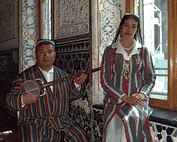 Ways of life are constantly changing all over the world. As they do so the music and culture that is associated with them changes too. It may be preserved in an artificial form, or it may die out completely. We have seen evidence of both these trends in Central Asia. We have also seen abundant evidence of vibrant, living traditions transforming and adapting to new environments. Munadjat Yulchieva (Day 7) is a good example. A nationally renowned figure she has managed to stay faithful to her musical tradition whilst raising the profile of maqam music.
Ways of life are constantly changing all over the world. As they do so the music and culture that is associated with them changes too. It may be preserved in an artificial form, or it may die out completely. We have seen evidence of both these trends in Central Asia. We have also seen abundant evidence of vibrant, living traditions transforming and adapting to new environments. Munadjat Yulchieva (Day 7) is a good example. A nationally renowned figure she has managed to stay faithful to her musical tradition whilst raising the profile of maqam music.
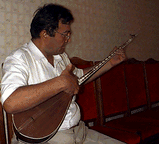 There is a marked distinction between the cultural life of the cities and the rural areas. Even in the pre-Soviet times cities were centres of culture where musicians gathered, the same is true now. Uzbekistan with it’s great cities has preserved the court music tradition even though the courts are long gone. Some musicians retain the link with the original tradition, but there is little space for them now. Abdurahim ( Day 8 ) for example one of the countries most highly esteemed musicians no longer makes a living through music and has become a businessman. Many are leaving the country for America and Israel. Even though there is something of a revival in national music (as a symbol of nationhood) this will not sustain the tradition. Musicians however are endlessly creative, and change comes about through a process of adaptation. The less fashionable Kashgar rubab has been superseded by the Tar from Azerbaijan. Perhaps a new tradition will arise out of the same feelings that inspired the shash maqam.
There is a marked distinction between the cultural life of the cities and the rural areas. Even in the pre-Soviet times cities were centres of culture where musicians gathered, the same is true now. Uzbekistan with it’s great cities has preserved the court music tradition even though the courts are long gone. Some musicians retain the link with the original tradition, but there is little space for them now. Abdurahim ( Day 8 ) for example one of the countries most highly esteemed musicians no longer makes a living through music and has become a businessman. Many are leaving the country for America and Israel. Even though there is something of a revival in national music (as a symbol of nationhood) this will not sustain the tradition. Musicians however are endlessly creative, and change comes about through a process of adaptation. The less fashionable Kashgar rubab has been superseded by the Tar from Azerbaijan. Perhaps a new tradition will arise out of the same feelings that inspired the shash maqam.
 In the rural areas the picture seems somewhat different. Musicians play a more integral role. In Kazakstan and Kyrgyzstan which were largely nomadic musicians still sustain an aural tradition which is part of everyday life and life events. Many great musicians are farmers or labourers who are partially self sufficient. Money means little to them and many seemed perplexed by our fees for recordings. The western distinctions of professional and amateur do not apply here. Music is too important to be exploited for money. As the rural ways of life continue so the music has survived alongside it. The hospitality often being inseparable from the music. Malika Askarova (Day 25) is a good example of this. She does not consider herself to be a musician and yet she is able to affect a listener in an extraordinary way. She did not understand why our contracts and fees were necessary. There was a sense that music is a gift which should be given freely, Malika was not the only musician who gave us this impression.
In the rural areas the picture seems somewhat different. Musicians play a more integral role. In Kazakstan and Kyrgyzstan which were largely nomadic musicians still sustain an aural tradition which is part of everyday life and life events. Many great musicians are farmers or labourers who are partially self sufficient. Money means little to them and many seemed perplexed by our fees for recordings. The western distinctions of professional and amateur do not apply here. Music is too important to be exploited for money. As the rural ways of life continue so the music has survived alongside it. The hospitality often being inseparable from the music. Malika Askarova (Day 25) is a good example of this. She does not consider herself to be a musician and yet she is able to affect a listener in an extraordinary way. She did not understand why our contracts and fees were necessary. There was a sense that music is a gift which should be given freely, Malika was not the only musician who gave us this impression.
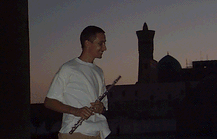 It has been through the attitudes of people that Central Asia has made it’s mark upon me. Whatever the external appearances or current economic situations of the countries, there is still a feeling of a great ‘civilisation’. I mean this in the sense of an internal process of development. A cultured people and not just people with a culture. Many of the musical genres still retain a philosophical and reflective content. These themes reflect a view of life and an attitude towards people that are quite different from those I am used to. The physical and the metaphysical are constantly intertwined in art as in life. The art forms often have a delicacy and subtlety which is deceptive. “The art that conceals art” – always hinting at a greater mystery beyond.
It has been through the attitudes of people that Central Asia has made it’s mark upon me. Whatever the external appearances or current economic situations of the countries, there is still a feeling of a great ‘civilisation’. I mean this in the sense of an internal process of development. A cultured people and not just people with a culture. Many of the musical genres still retain a philosophical and reflective content. These themes reflect a view of life and an attitude towards people that are quite different from those I am used to. The physical and the metaphysical are constantly intertwined in art as in life. The art forms often have a delicacy and subtlety which is deceptive. “The art that conceals art” – always hinting at a greater mystery beyond.
Central Asia is a wonderful and fascinating place. I hope that our reflections serve to wet the appetite of other travelers. Our journey was not a survey of the area, more like an account of some almost random events. Like any supposedly random events they have their own logic and they tell their own story. We will meet again…
Day 25 – The Pulse of the Maternal Heart
Posted by Musical Nomad in Daily Blog on August 22, 1997
 There are few female drummers, Evelyn Glennie takes on a male world almost alone. I can’t ever remember seeing female drummers in Africa. For the last couple of days we have been entertained by five women doira players from Kokand. There’s something about the pulse, the heartbeat of the drum that seems close to the maternal spirit, why are there not more female drummers? Rakhimahon Mazokhidova lives her life to a strong rhythm, our interpreter Matluba described her as an entrepreneur worthy of support from BWAK (see day 23). When we met Rakhimahon again in the courtyard of her home, surrounded by children and wild birds, she suggested she sang us a lullaby. No drums just a dignified grandmother singing to an imagined child as many of her real charges now formed an adult audience. I sat spellbound by this charismatic Uzbek star.
There are few female drummers, Evelyn Glennie takes on a male world almost alone. I can’t ever remember seeing female drummers in Africa. For the last couple of days we have been entertained by five women doira players from Kokand. There’s something about the pulse, the heartbeat of the drum that seems close to the maternal spirit, why are there not more female drummers? Rakhimahon Mazokhidova lives her life to a strong rhythm, our interpreter Matluba described her as an entrepreneur worthy of support from BWAK (see day 23). When we met Rakhimahon again in the courtyard of her home, surrounded by children and wild birds, she suggested she sang us a lullaby. No drums just a dignified grandmother singing to an imagined child as many of her real charges now formed an adult audience. I sat spellbound by this charismatic Uzbek star.
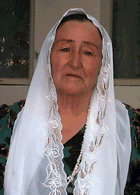 As long as mothers sing to children there’s hope for this world, I hope her many pupils take up this complement to the rattling doira.
As long as mothers sing to children there’s hope for this world, I hope her many pupils take up this complement to the rattling doira.
We set out on an early morning journey from Kokand to Andijan across the valley to track down a lady called Malika Askarova. She had been recommended to us by our music advisor Dr. Razia Sultanova who was born in the area. We had limited time to find her – with a deadline to get across the border into Kyrgyzstan. Our driver Bahadir took the quest into his own hands. At first we did not mind this, it was his last day with us. He thought the town we were looking for was near Fergana. He then repeated a similar pattern of question, answer, drive: 1 Screech to a halt next to someone who looks ‘intelligent’ 2 Shout politely at them for directions to a village they have never heard of. 3 Go whichever way they suggest and finally 4 At the very next junction, usually 3 minutes later, repeat the loop. After two hours of this we had had enough and gave up. By mistake we found ourselves at the village of Durtor. One feature aroused the curiousity of the team. A circular, mud encased building stood bizarrely in the centre of the square. Balanced on top of this hollow mound was a tree complete with roots, precariously balanced. Strangest of all were the carvings on the top – three swan/dragon-like creatures all in motion, facing the same way. I walked inside and saw Arabic inscriptions carved deep into the ceiling, ‘Allah Askadu’ (Allah is Unique). The locals didn’t know the building’s real purpose but said it had been built during the last war, though it looked pretty new.
By mistake we found ourselves at the village of Durtor. One feature aroused the curiousity of the team. A circular, mud encased building stood bizarrely in the centre of the square. Balanced on top of this hollow mound was a tree complete with roots, precariously balanced. Strangest of all were the carvings on the top – three swan/dragon-like creatures all in motion, facing the same way. I walked inside and saw Arabic inscriptions carved deep into the ceiling, ‘Allah Askadu’ (Allah is Unique). The locals didn’t know the building’s real purpose but said it had been built during the last war, though it looked pretty new.
A man stood quietly next to a roundabout “Do you know the town Durdur”, “Yes” he replied and continued knowingly, “I know Malika, she’s my neighbour. I’ll take you there”. Later he said Allah had placed him there so he could take us to her. Who knows?
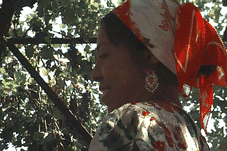 Malika Askarova looks in her forties. She has an expressive and beautiful face which smiles easily. She’s naturally a humble person and could not believe for sometime that we had come to see her. Before long the Uzbek hospitality was bringing us all together and friends and family were gathering to see what was going on. We must have seemed like aliens suddenly arriving out of nowhere in our shiny ‘Nomadmobile’ full of equipment.
Malika Askarova looks in her forties. She has an expressive and beautiful face which smiles easily. She’s naturally a humble person and could not believe for sometime that we had come to see her. Before long the Uzbek hospitality was bringing us all together and friends and family were gathering to see what was going on. We must have seemed like aliens suddenly arriving out of nowhere in our shiny ‘Nomadmobile’ full of equipment.
 Malika is an Otin-Oy or female Sufi. She reads Arabic and studies the ‘old books’ including the works of Ahmad Yasavi – see day 20. She’s called upon for occasions such as weddings and funerals and reads from these old texts in a strong and beautiful voice. She also composes her own songs. When we asked what they were about she explained that she had often been alone in her life, losing her husband when still young. These songs she sang ‘from her heart’ about her life. Malika takes several minutes to prepare herself before singing. Even without understanding the words we could tell they were delivered with considerable emotional force, several of the women present were moved to tears.
Malika is an Otin-Oy or female Sufi. She reads Arabic and studies the ‘old books’ including the works of Ahmad Yasavi – see day 20. She’s called upon for occasions such as weddings and funerals and reads from these old texts in a strong and beautiful voice. She also composes her own songs. When we asked what they were about she explained that she had often been alone in her life, losing her husband when still young. These songs she sang ‘from her heart’ about her life. Malika takes several minutes to prepare herself before singing. Even without understanding the words we could tell they were delivered with considerable emotional force, several of the women present were moved to tears.
We played some recordings to the gathering, Shaykh Kuskarov?s mantra and the Zikr from Kokand. The mantra aroused some curiosity but didn’t seem familiar, however the Zikr induced nods and smiles of recognition. We were told that Malika also performs this Zikr. She became interested in spiritual matters when she was fourteen. Her spiritual mentor was an old woman from the village who also taught her Arabic. Malika’s role is similar to the Kokand women that we met recently. Even though our meeting came about in a strange and unexpected way it seemed quite natural. She has an openness about her that makes you feel welcome and we were all sad to leave.
She became interested in spiritual matters when she was fourteen. Her spiritual mentor was an old woman from the village who also taught her Arabic. Malika’s role is similar to the Kokand women that we met recently. Even though our meeting came about in a strange and unexpected way it seemed quite natural. She has an openness about her that makes you feel welcome and we were all sad to leave.
As the sun slowly falls behind the approaching peaks, we head across the border to Osh.
Tomorrow a mammoth 15 hour journey across Kyrgyzstan to Biskek. We will send a report en-route